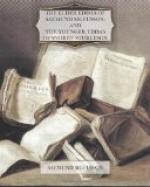“Verily,” said Gangler, “an evil progeny is that of Loki, yet most mighty and powerful; but since the gods have so much to fear from the wolf, why did they not slay him?”
“The gods have so much respect for the sanctity of their peace-steads,” replied Har, “that they would not stain them with the blood of the wolf, although prophecy had intimated to them that he must one day become the bane of Odin.”
OF THE GODDESSES.
36. “Tell me now,” said Gangler, “which are the goddesses?”
“The first,” replied Har, “is Frigga, who has a magnificent mansion called Fensalir. The second is Saga, who dwells at Sokkvabekk, a very large and stately abode. The third is Eir, the best of all in the healing art. The fourth, named Gefjon, is a maid, and all those who die maids become her hand-maidens. The fifth is Fulla, who is also a maid, and goes about with her hair flowing over her shoulders, and her head adorned with a gold ribbon. She is entrusted with the toilette and slippers of Frigga, and admitted into the most important secrets of that goddess. Freyja is ranked next to Frigga: she is wedded to a person called Odur, and their daughter, named Hnossa, is so very handsome that whatever is beautiful and precious is called by her name (hnosir.) But Odur left his wife in order to travel into very remote countries. Since that time Freyja continually weeps, and her tears are drops of pure gold. She has a great variety of names, for having gone over many countries in search of her husband, each people gave her a different name. She is thus called Mardoll, Horn, Gefn, and Syr, and also Vanadis. She possesses the necklace Brising. The seventh goddess is Sjofna, who delights in turning men’s hearts and thoughts to love; hence a wooer is called, from her name, Sjafni. The eighth, called Lofna, is so mild and gracious to those who invoke her, that by a peculiar privilege which either All-Father himself or Frigga has given her, she can remove every obstacle that may prevent the union of lovers sincerely attached to each other. Hence her name is applied to denote love, and whatever is beloved by men. Vora, the ninth goddess, listens to the oaths that men take, and particularly to the troth plighted between man and woman, and punishes those who keep not their promises. She is wise and prudent, and so pentrating that nothing remains hidden from her. Syn, the tenth, keeps the door in the hall, and shuts it against those who ought not to enter. She presides at trials when any thing is to be denied on oath, whence the proverb, ‘Syn (negation) is set against it,’ when ought is denied. Hlina, the eleventh, has the care of those whom Frigga intends to deliver from peril. Snotra, the twelfth, is wise and courteous, and men and women who possess these qualities have her name applied to them. Gna, the thirteenth, is the messenger that Frigga sends into the various worlds on her errands. She has a horse that can run through air and water, called Hofvarpnir. Once, as she drove out, certain Vanir saw her car in the air, when one of them exclaimed,




